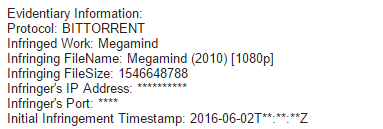 As the former operators of Megaupload are only too aware, hosting user-uploaded content can be a perilous activity, even when the Digital Millennium Copyright Act is followed to the letter. Sun Social Media (SSM), a US-based company behind several video platforms, have also had a taste of the risks.
As the former operators of Megaupload are only too aware, hosting user-uploaded content can be a perilous activity, even when the Digital Millennium Copyright Act is followed to the letter. Sun Social Media (SSM), a US-based company behind several video platforms, have also had a taste of the risks.
In addition to dating sites, SSM owns four so-called tube sites – Playvid.com, Playvids.com, Peekvids.com, and Feedvid.com. Adult video company Hydentra HLP (also known as MetArt Network), the operator of more than a dozen porn sites, sued SSM claiming that more than 70 of its videos appeared on SSM’s sites without permission.
According to court papers, SSM sites host more than 475,000 adult videos uploaded by their users. Each must agree only to upload videos to which they have the rights. Once uploaded, an independent outside contractor checks every video to ensure they don’t contain criminally illegal content or spam. If they do they are blocked.
In addition to SSM and its four videos sites, Hydentra named two other defendants in the case, SSM director Konstantin Bolotin and Constantin Luchian of IncorporateNow Inc, a company that among other things acts as SSM’s registered DMCA agent. Documents show that SSM accepts copyright claims in various formats, from email and fax, their ‘contact us’ page, through to the unlikely option of posting claims through the mail. Claims are processed within 48 hours.
Importantly, SSM also has a repeat infringer policy operating on a “three strikes in six months and you’re out” basis. To date, SSM has reportedly terminated more than 1,000 users for multiple infringements.
Hydentra hired anti-piracy company Battleship Stance LLC to tackle infringement on various platforms including those operated by SSM. In the majority of cases these were sent electronically and actioned quickly. However, on one occasion the company chose to send 56 DMCA notices to SSM’s DMCA agent IncorporateNow. Printed on paper, delivered through the mail.
The package was signed for on January 20, 2015 by IncorporateNow’s landlord’s receptionist but for reasons that aren’t clear, DMCA agent Constantin Luchian never personally received the package. As a result the content stayed up.
On June 4, 2015, Hydentra filed a complaint against SSM, who at this point became aware of the allegedly infringing content. SSM disabled the files as appropriate but the lawsuit continued.
Hydentra filed claims for direct infringement, contributory infringement, vicarious copyright infringement, inducement of copyright infringement plus various claims related to trademarks.
Later, both parties filed Cross-Motions for Summary Judgment on each of the plaintiff’s claims. At the Federal Court in Miami, things didn’t go well for Hydentra.
“The Court agrees with Defendants that in imposing liability upon an internet service provider for third-party users’ uploading of copyrighted material, Plaintiff must establish that Defendants engaged in a volitional act to cause the illegal copying,” the judge wrote.
“To find otherwise would impose liability upon an otherwise passive internet service provider for conduct that is simply out of its control.”
No such acts were established resulting in SSM’s motion for Summary Judgment being granted and Hydentra’s being denied.
In respect of the claims of contributory infringement, SSM said that it could not be held liable since it had no knowledge of the paper-based DMCA notices. Once notified via lawsuit, all of the videos were removed. The judge said the matter of lost notices couldn’t be resolved during a motion for Summary Judgment.
“Neither party has cited cases, nor has the Court been able to locate cases, where a DMCA Designated Agent lost take-down notices, causing an internet service provider to incur liability for copyright infringement based upon constructive knowledge,” the judge wrote.
Furthermore, for a contributory infringement claim to succeed, Hydentra would need to show that SSM’s tube sites were not capable of “substantial noninfringing uses.” The company failed to do so.
“While the record is clear that at times, third-party users of Defendants’ Websites upload copyrighted material, there is record evidence that the Websites are capable of being used for purposes other than copyright infringement,” the judge noted.
SSM’s motion to dismiss was granted. The claim of Vicarious Copyright Infringement received the same treatment.
“To prevail on a claim for vicarious infringement, a plaintiff must allege that the defendant ‘infringes vicariously by profiting from direct infringement while declining to exercise a right to stop or limit it’,” the judge wrote.
“Plaintiff’s argument that the infringed videos somehow attracted and
drew more visitors to Defendants’ Websites, which allowed Defendants to receive more revenue in advertisements, is not supported by record evidence and is highly speculative.”
The claim of Inducement of Copyright Infringement was dealt with even more swiftly.
“The Court agrees with Defendants that there is no record evidence that Defendants induced the third-party users into uploading copyrighted
material. To the contrary, the record is clear that Defendants operated as passive internet service providers,” the judge wrote.
Val Gurvits of Boston Law Group, who along with local counsel Brady Cobb defended the tube sites, is pleased with the result.
“SunSocial had a strong record of responding to DMCA notices and of terminating repeat infringers. Of note is that in dismissing their copyright claims, the court actually ruled on the underlying merits of the case, and not on DMCA safe-harbor,” he informs TF.
Nevertheless, Gurvits says that the sending of the paper notices was a troubling development.
“Plaintiff intentionally manufactured a DMCA ‘non-compliance’ situation by interjecting paper DMCA notices into an established course of dealings via electronic ones. They first sent all DMCA notices electronically, and SunSocial diligently acted on all of them. Then for some reason they sent 56 paper notices (allegedly in one FedEx package). Then they continued to send electronic notices,” Gurvits says.
“The only reason for Hydentra to interject paper notices into an established exchange of electronic notices is because they hope that recipient will mistakenly miss some of them. It seems they used this process as a pretext for filing some of their other presently pending lawsuits.”
Meanwhile, Hydentra is extremely active taking down content from Google, with more than 2.4 million URLs removed to date.
Source: TF, for the latest info on copyright, file-sharing, torrent sites and ANONYMOUS VPN services.

 This year HBO decided to stop releasing promotional Game of Thrones screeners to the press.
This year HBO decided to stop releasing promotional Game of Thrones screeners to the press. 
 This week we have four newcomers in our chart.
This week we have four newcomers in our chart. 
 Nearly a decade ago, research from the University of Washington revealed that some piracy tracking outfits were
Nearly a decade ago, research from the University of Washington revealed that some piracy tracking outfits were 
